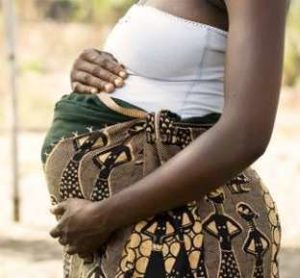KHRC undertakes studies to stop mother to child transmission of infections
 A study to assess the extent to which pregnant women can pass on infections to their children has been undertaken at the Kintampo Health Research Centre in the Bono East Region.
A study to assess the extent to which pregnant women can pass on infections to their children has been undertaken at the Kintampo Health Research Centre in the Bono East Region.
Infections contribute to over 10 per cent of maternal deaths and approximately a quarter of newborn deaths worldwide.
Mrs Irene Apewe Adjei, a research fellow at the KHRC speaking during a meeting with journalists at Kintampo said pregnancy could result in increased susceptibility of women to infections which they can pass on to babies in utero or around the time of birth and this could result in adverse outcomes for infants.
Research suggests that some of these adverse outcomes are intrauterine growth restriction, preterm birth, stillbirths and severe neonatal morbidities.
Mrs Apewe Adjei said the study sought to quantify the burden of diseases due to Group B streptococcus, Respiratory syncytial virus, Influenza, and Pertussis (GRIP) in pregnant women and their infants.
The research was carried out in Ghana and Zimbabwe and the results are yet to come out. The study was funded by the European Commission.
Mrs Apewe Adjei said the short name for the study is the burden of GRIP study from the first letters of the four infections under study.
Group B Streptococcus (GBS) is a gram positive bacteria that colonizes the gastrointestinal and genitourinary tract. It causes invasive disease primarily in infants and is a leading cause of neonatal sepsis and meningitis in many countries.
Pertussis/whooping cough which is a known “killer disease” among infants. Respiratory Syncytial Virus (RSV) and Influenza viruses have also been the main causes of pneumonia and other severe respiratory infections in infants.
Vaccines are available for influenza and pertussis but none are currently licensed for GBS and RSV. There are regional variations in the burden of these infections and scarcity of data from sub-Saharan Africa.
This is partly because the tests are expensive to conduct and most laboratories are not adequately equipped to conduct these tests.
The study was conducted by the Kintampo Health Research Centre in Ghana and the Centre for Sexual Health and HIV/AIDS Research (CeSHHAR) in Zimbabwe in collaboration with the Liverpool School of Tropical Medicine.
In Ghana, it was conducted in communities within the Kintampo North Municipality and Kintampo South district.
Mrs Apewe Adjei said pregnant women, 13-28 weeks gestation and resident in the study area were consented and enrolled on the study by trained field workers.
They were followed-up monthly till their pregnancies ended. Their babies were followed up till they were a year old before they exited the study.
Enrolment for Ghana started in October 2018 and a total of 613 were enrolled on the study. Vaginal swabs and blood samples were taken from pregnant women at 36 weeks gestation or before delivery by trained nurses/midwives. Cord blood samples were taken at birth. Nasal swab samples were also taken when participants had influenza-like symptoms.
Participants sought healthcare from the Kintampo Municipal Hospital. Laboratory tests for patient management were conducted at the Seth Owusu-Agyei clinical laboratory of KHRC. Field data collection has ended and laboratory analysis of samples is ongoing.
By Eunice Menka
Copyright ©2022 by NewsBridge Africa
All rights reserved. This article or any portion thereof may not be reproduced or used in any manner whatsoever without the express written permission of the publisher except for the use of brief quotations in reviews.
